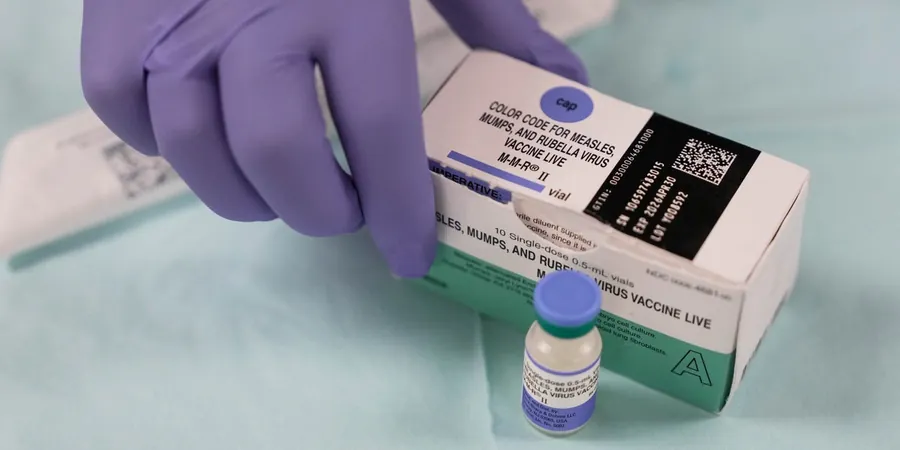
America's Measles Battle: Are We on the Brink of Losing Elimination Status?
2025-07-14
Author: Sophie
A Stark Reality Check on Measles Cases
The United States is facing a shocking surge in measles cases, with reports for the first half of this year surpassing the totals for any full year since 1992. This alarming trend has sparked fears that the nation might lose its hard-earned measles elimination status, a public health milestone achieved just over 25 years ago, all due to declining vaccination rates.
What Does Losing Elimination Status Mean?
But what would this actually mean for Americans? The World Health Organization (WHO) stipulates that to maintain elimination status, a country must remain free from continuous domestic transmission of the virus for at least 12 months. In simpler terms, any new outbreaks must originate from outside the U.S. If the current outbreaks aren’t cleared by January, the U.S. faces losing its title as measles-free.
"This could have far-reaching consequences that many may not realize," warns Brittany Kmush, an associate professor at Syracuse University. "It could complicate international travel and even lead to strict vaccination requirements for re-entry into other countries."
The Contagion Threat and Health Risks
The risk is grave; measles is one of the most infectious diseases globally. The Centers for Disease Control and Prevention (CDC) estimates that if one person is infected, up to 90% of unvaccinated individuals nearby could contract the disease. It’s not just a mild illness—it can lead to severe complications, including pneumonia and encephalitis, particularly in young children under five.
Is There Still Time to Act?
Despite the alarming situation, experts like William Moss from Johns Hopkins University believe there’s still hope to combat these outbreaks. Though cases have decreased since the peak in March, vaccine rates remain worryingly low, reducing herd immunity and leaving communities vulnerable to new outbreaks.
"It’s a matter of time before an infectious individual may enter a community with low vaccinations and spark a new outbreak,” Moss cautioned, comparing the situation to a fiery ember landing in a dry area.
What Happens if We Lose Elimination Status?
If the U.S. loses its measles elimination status, regaining it won’t be an easy task. The country must demonstrate three consecutive years of zero transmission within its borders, coupled with a robust virus surveillance system.
The Call for Vaccination and Public Awareness
Both Kmush and Moss emphasize the urgent need to boost vaccination rates among the public, which they describe as the most powerful tool for controlling outbreaks. They also point out the crucial role of health officials in combatting vaccine hesitancy spurred by misinformation. Kmush highlighted, "The rhetoric surrounding vaccines can dissuade individuals from getting immunized, which is extremely dangerous."
Consequences of Negligence and Myths
Further complicating matters is the presence of anti-vaccine advocates. Figures like Robert F. Kennedy Jr., who have a history of spreading falsehoods about vaccines, undermine public trust in immunization efforts. Before the measles vaccine was widely used, the U.S. experienced tens of thousands of hospitalizations and hundreds of deaths each year.
Hope on the Horizon?
As we approach the remainder of the year, some health officials maintain that the risk for the general population remains low compared to other developed countries. However, ongoing vigilance and a renewed commitment to vaccination are critical to preserving America’s hard-fought health achievements. Health agencies continue to recommend the measles, mumps, and rubella (MMR) vaccine as the best line of defense.









 Brasil (PT)
Brasil (PT)
 Canada (EN)
Canada (EN)
 Chile (ES)
Chile (ES)
 Česko (CS)
Česko (CS)
 대한민국 (KO)
대한민국 (KO)
 España (ES)
España (ES)
 France (FR)
France (FR)
 Hong Kong (EN)
Hong Kong (EN)
 Italia (IT)
Italia (IT)
 日本 (JA)
日本 (JA)
 Magyarország (HU)
Magyarország (HU)
 Norge (NO)
Norge (NO)
 Polska (PL)
Polska (PL)
 Schweiz (DE)
Schweiz (DE)
 Singapore (EN)
Singapore (EN)
 Sverige (SV)
Sverige (SV)
 Suomi (FI)
Suomi (FI)
 Türkiye (TR)
Türkiye (TR)
 الإمارات العربية المتحدة (AR)
الإمارات العربية المتحدة (AR)